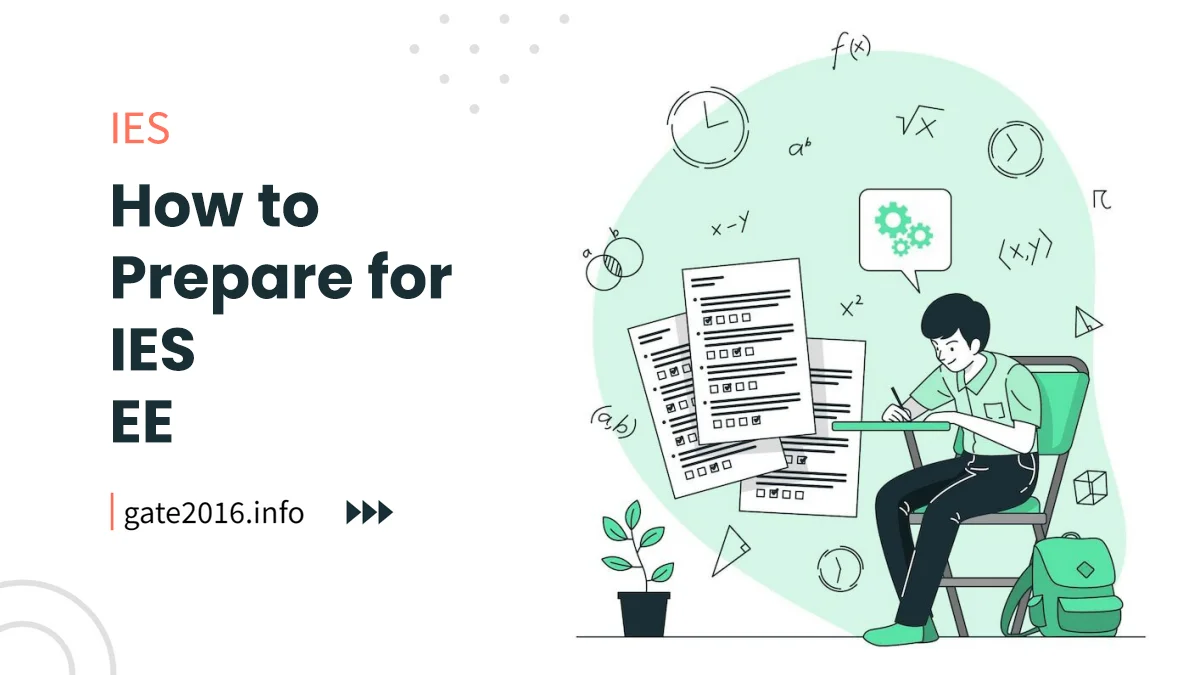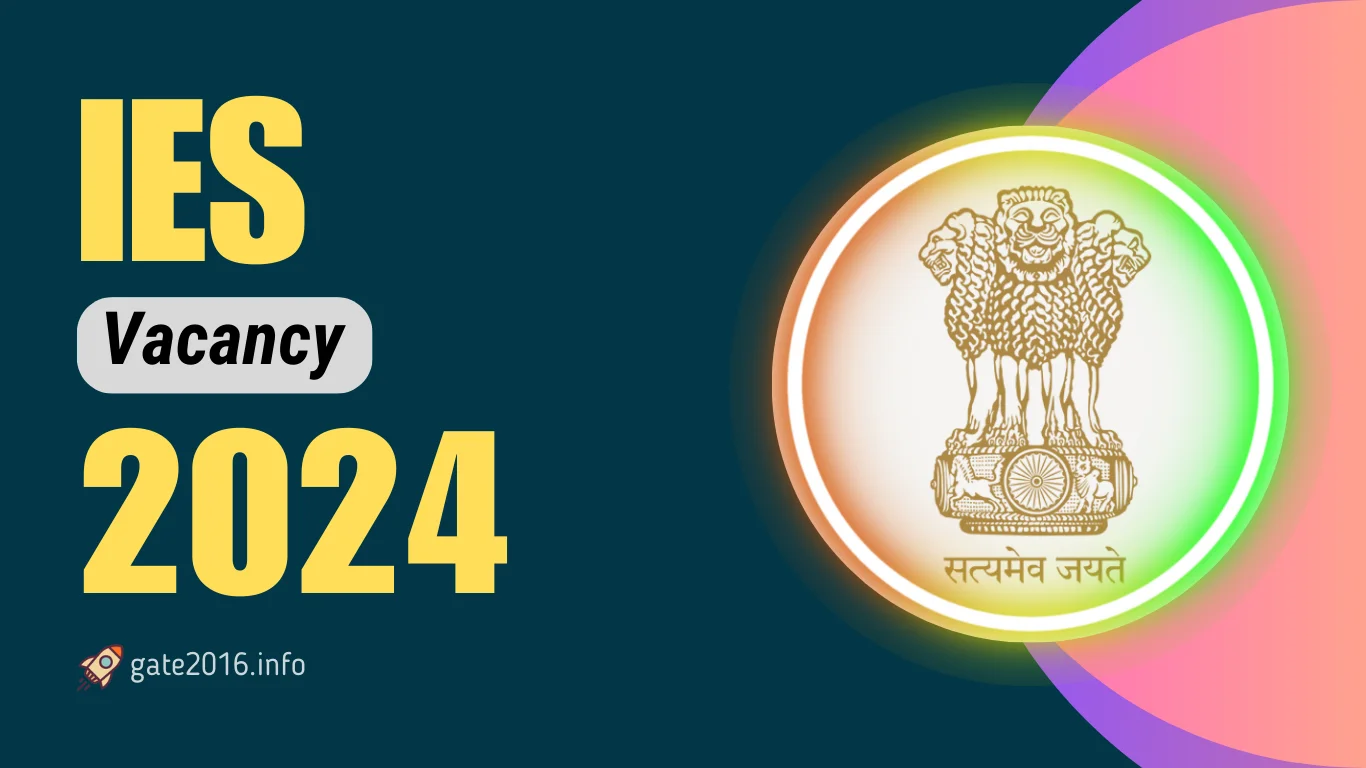Advertisements
Ratings

IES 2024 EE Preparation – The Indian Engineering Services (IES) exam is a prestigious opportunity for engineering graduates to secure positions in various government departments and organizations.
For aspiring electrical engineers, the IES Electrical Engineering exam opens doors to a fulfilling career in the public sector.
This comprehensive guide will provide you with a step-by-step approach to prepare for the IES Electrical Engineering exam and excel in this competitive endeavor.
Contents
- 1. Understanding the Importance of IES Electrical Engineering
- 2. IES Electrical Engineering Syllabus Overview
- 3. Understanding the IES Exam Pattern
- 4. Developing an Effective Study Plan
- 5. Choosing the Right Study Materials
- 6. Mastering Core Electrical Engineering Concepts
- 7. Problem-Solving Practice
- 8. Reviewing Previous Years’ Question Papers
- 9. Taking Mock Tests
- 10. Effective Time Management Strategies
- 11. Implementing Revision Techniques
- 12. Staying Informed with Engineering Trends
- 13. Managing Exam Stress
- 14. Final Weeks’ Preparation Strategy
- 15. Approaching Exam Day
- 16. Post-Exam Analysis and Next Steps
- Conclusion: Excelling in IES Electrical Engineering
- Additional Resources and References
- IES Electrical Engineering Guidance
- IES Electrical Engineering Preparation FAQs
- IES Total Information & Guidance
1. Understanding the Importance of IES Electrical Engineering
The IES Electrical Engineering exam holds immense significance for individuals aiming to establish a career in the government sector.
It not only offers job stability but also provides opportunities to contribute to critical infrastructure projects and technological advancements.
2. IES Electrical Engineering Syllabus Overview
The IES Electrical Engineering syllabus encompasses various subjects, ranging from power systems to electronics. Here’s a breakdown of the main subjects and key topics:
Table 1: IES Electrical Engineering Syllabus Breakdown
| Subject | Key Topics |
|---|---|
| Electrical Circuits | Circuit Theorems, Network Analysis, Resonance |
| Electrical Machines | Transformers, Induction Motors, Synchronous Generators |
| Power Systems | Transmission, Distribution, Load Flow Analysis |
| Control Systems | Control Theory, Stability, Block Diagrams |
| Electronics | Analog and Digital Electronics, Communication Systems |
| Electrical Materials | Dielectric Materials, Insulation Techniques |
3. Understanding the IES Exam Pattern
Before diving into preparation, it’s essential to understand the IES exam pattern:
- Preliminary Examination: The preliminary exam consists of objective papers (General Studies and Engineering Aptitude) and an Engineering Paper.
- Main Examination: The main exam comprises conventional papers focusing on specific engineering disciplines.
- Personal Interview and Personality Test: Shortlisted candidates from the main exam are called for an interview to assess their personality and suitability for the role.
4. Developing an Effective Study Plan
Creating a well-structured study plan is the foundation of efficient preparation:
- Self-Assessment: Identify your strengths and weaknesses in different subjects.
- Study Schedule: Create a daily or weekly schedule, allocating time for each subject.
- Consistent Practice: Dedicate time to solving practice problems and revising concepts.
- Mock Tests: Include regular mock tests to gauge your progress and improve time management.
Table 2: Sample Study Plan
| Week | Subjects/Topics | Time Allocation |
|---|---|---|
| 1-2 | Electrical Circuits | 10 hours/week |
| 3-4 | Electrical Machines | 12 hours/week |
| 5-6 | Power Systems | 10 hours/week |
| 7-8 | Control Systems | 8 hours/week |
5. Choosing the Right Study Materials
Selecting the appropriate study materials is pivotal for comprehensive learning:
Table 3: Recommended Study Resources
| Subject | Books | Online Resources |
|---|---|---|
| Electrical Circuits | “Electric Circuits” by James W. Nilsson | NPTEL’s Electrical Engineering Courses |
| Electrical Machines | “Electric Machinery Fundamentals” by Stephen J. Chapman | Coursera’s Electrical Engineering Courses |
| Power Systems | “Power System Analysis” by Hadi Saadat | Khan Academy’s Power Systems |
| Control Systems | “Automatic Control Systems” by Benjamin C. Kuo | edX’s Control Systems Engineering Course |
| Electronics | “Microelectronic Circuits” by Adel S. Sedra | MIT OpenCourseWare Electronics |
6. Mastering Core Electrical Engineering Concepts
Building a strong foundation in core electrical engineering concepts is essential:
- Electrical Circuits: Understand circuit theorems, network analysis, and resonance.
- Electrical Machines: Grasp concepts of transformers, motors, and generators.
- Power Systems: Familiarize yourself with transmission, distribution, and load flow analysis.
7. Problem-Solving Practice
Regular practice of problem-solving enhances your skills:
- Variety of Problems: Solve problems of varying difficulty levels to hone your problem-solving abilities.
- Application of Principles: Apply electrical engineering principles to real-world scenarios for deeper understanding.
8. Reviewing Previous Years’ Question Papers
Solving past years’ question papers provides invaluable insights:
Table 4: Benefits of Solving Previous Years’ Papers
| Benefit | Description |
|---|---|
| Identify Question Patterns | Recognize recurring question types |
| Time Management | Practice managing time during the exam |
| Focus on Key Topics | Understand distribution of questions |
| Self-Assessment | Evaluate your level of preparedness |
9. Taking Mock Tests
Mock tests simulate exam conditions and help assess your readiness:
Table 5: Benefits of Taking Mock Tests
| Benefit | Description |
|---|---|
| Simulate Exam Conditions | Experience time constraints and exam pressure |
| Time Management | Enhance time allocation for each section |
| Performance Analysis | Identify strengths and weaknesses |
| Build Confidence | Boost self-assurance before the exam |
10. Effective Time Management Strategies
Time management during the exam is crucial for optimal performance:
Table 6: Time Management Strategy
| Section | Recommended Time Allocation |
|---|---|
| General Studies and Engineering Aptitude | 2 hours |
| Engineering Paper | 3 hours |
| Conventional Papers | Varies by paper |
11. Implementing Revision Techniques
Regular revision ensures retention of information:
- Structured Revision: Allocate time for revisiting key concepts.
- Summary Notes: Create concise notes for quick review before the exam.
12. Staying Informed with Engineering Trends
Stay updated with the latest developments and trends in engineering:
- Engineering Journals: Subscribe to reputable journals for recent research and advancements.
- Industry News: Read engineering magazines, news, and online sources to stay informed.
13. Managing Exam Stress
Effective stress management enhances performance:
- Relaxation Techniques: Practice meditation, deep breathing, and relaxation exercises.
- Healthy Lifestyle: Incorporate physical activity, proper nutrition, and breaks into your routine.
14. Final Weeks’ Preparation Strategy
Focus intensively on challenging topics in the final weeks:
- Intense Revision: Allocate more time to topics that require further understanding.
- Additional Mock Tests: Take extra mock tests to refine your preparation.
15. Approaching Exam Day
Approach the exam day calmly and confidently:
- Read Instructions: Carefully read and understand question patterns and instructions.
- Time Management: Allocate time based on question weightage and complexity.
16. Post-Exam Analysis and Next Steps
Evaluate your performance and plan your next steps:
- Performance Evaluation: Identify areas for improvement and acknowledge strengths.
- Future Plans: Consider advanced studies or career opportunities based on your results.
Conclusion: Excelling in IES Electrical Engineering
By adhering to the comprehensive strategies outlined in this guide, aspiring electrical engineers can establish a robust preparation plan for the IES Electrical Engineering exam.
Success in this exam not only opens doors to rewarding career opportunities but also contributes to the nation’s technological progress.
Additional Resources and References
Explore the recommended textbooks, online courses, and practice papers mentioned in this guide for additional study materials and references.
These resources will further enhance your understanding and preparation for the IES Electrical Engineering exam.
IES Electrical Engineering Guidance
- How to Prepare for IES Electrical Engineering: A Comprehensive Guide
- IES EE Syllabus 2024: Prelims and Mains
- IES EE Subjective Papers – (2023-1987)
- IES EE Objective Papers – (2023-1997)
- IES EE Books 2024: Prelims and Mains
IES Electrical Engineering Preparation FAQs
What is IES Electrical Engineering (EE)?
IES Electrical Engineering is a competitive examination conducted by the Union Public Service Commission (UPSC) in India.
It is part of the Indian Engineering Services (IES) examination and is conducted to recruit engineers for various government departments and organizations. IES EE assesses candidates' knowledge and skills in electrical engineering.
What are the important subjects to focus on for IES Electrical Engineering preparation?
Key subjects to focus on include electrical circuits, electrical machines, power systems, control systems, electronics, electrical measurements, and electrical and electronic materials. The IES EE syllabus covers a wide range of topics in electrical engineering.
How should I prepare for the IES EE exam?
Effective preparation involves a comprehensive approach:
- Create a structured study plan based on the IES EE syllabus.
- Utilize standard textbooks and reference materials for each subject.
- Solve previous years' question papers and practice mock tests to get a feel for the exam pattern.
- Focus on numerical problem-solving and conceptual understanding.
- Stay updated with current trends in electrical engineering and government policies related to the field.
Are there any recommended books or resources for IES Electrical Engineering preparation?
Yes, some recommended books and resources include:
- 'Electrical Machinery' by P.S. Bimbhra
- 'Power Systems' by C.L. Wadhwa
- 'Automatic Control Systems' by Benjamin C. Kuo
- 'Electronics Devices and Circuit Theory' by Robert L. Boylestad and Louis Nashelsky
- Online courses, lecture videos, and research papers from reputable institutions and platforms related to electrical engineering.
What is the exam pattern for IES Electrical Engineering, and how should I approach it?
IES EE consists of a written examination followed by an interview. The written examination typically comprises two papers—Paper I (Objective) and Paper II (Conventional).
Paper I consists of multiple-choice questions, while Paper II involves descriptive answers.
To approach it effectively, practice time management, work on problem-solving skills, and focus on both theoretical and practical aspects of electrical engineering.
Additionally, prepare for the interview by revising core concepts and staying updated with industry developments.
Recent Posts
- IES 2024 Expected Cut-off Marks: Prelims and Mains
- How to Prepare for IES Electrical Engineering: A Comprehensive Guide
- How to Prepare for IES Electronics Engineering: A Comprehensive Guide
- IES 2024 Vacancy – Branch-wise and Category-wise Distribution
Related Tags
How to prepare for ies electrical engineering quora 2024, How to prepare for ies electrical engineering pdf 2024, ies electrical syllabus 2024, ies exam preparation books 2024, is ies tougher than jee 2024, ies preparation strategy for civil 2024, ies preparation strategy for ece 2024, ies preparation strategy for mechanical 2024
| IES/ESE GS & EA Books |
| IES/ESE Guide Books |
IES Total Information & Guidance
Click below given links to get further information.



